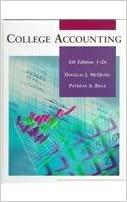Answered step by step
Verified Expert Solution
Question
1 Approved Answer
Arnez Company's annual accounting period ends on December 31. The following information concerns the adjusting entries to be recorded as of that date. The Office
Arnez Company's annual accounting period ends on December 31. The following information concerns the adjusting entries to be recorded as of that date.
- The Office Supplies account started the year with a $2,925 balance. During the year, the company purchased supplies for $12,080, which was added to the Office Supplies account. The inventory of supplies available at December 31 totaled $2,574.
- The Prepaid Insurance account had a $31,320 debit balance at December 31 before adjusting for the costs of any expired coverage for the year. An analysis of prepaid insurance shows that $22,535 of unexpired insurance coverage remains at year-end.
- The company has 15 employees, who earn a total of $2,250 in salaries each working day. They are paid each Monday for their work in the five-day workweek ending on the previous Friday. Assume that December 31 is a Tuesday, and all 15 employees worked the first two days of that week. Because New Year's Day is a paid holiday, they will be paid salaries for five full days on Monday, January 6 of next year.
- The company purchased a building at the beginning of this year. It cost $990,000 and is expected to have a $45,000 salvage value at the end of its predicted 35-year life. Annual depreciation is $27,000.
- Since the company is not large enough to occupy the entire building it owns, it rented space to a tenant at $2,400 per month, starting on November 1. The rent was paid on time on November 1, and the amount received was credited to Rent Revenue. However, the tenant has not paid the December rent. The company has worked out an agreement with the tenant, who has promised to pay both December and January rent in full on January 31.
- On November 1, the company rented space to another tenant for $2,174 per month. The tenant paid five months' rent in advance on that date. The payment was recorded with a credit to the Unearned Revenue account. Assume no other adjusting entries are made during the year.
Required:
- Use the information to prepare adjusting entries as of December 31.
- Prepare journal entries to record the first subsequent cash transaction in January of the next year for parts c and e.









Step by Step Solution
There are 3 Steps involved in it
Step: 1

Get Instant Access to Expert-Tailored Solutions
See step-by-step solutions with expert insights and AI powered tools for academic success
Step: 2

Step: 3

Ace Your Homework with AI
Get the answers you need in no time with our AI-driven, step-by-step assistance
Get Started


